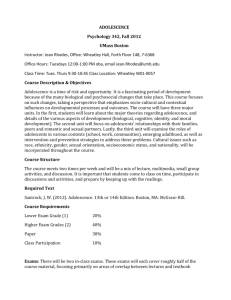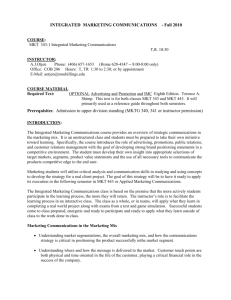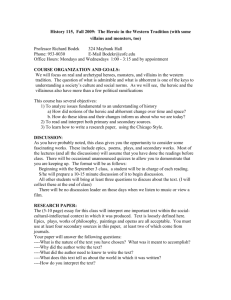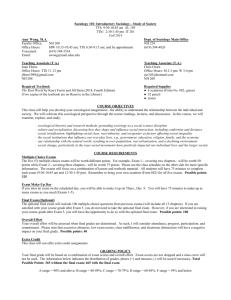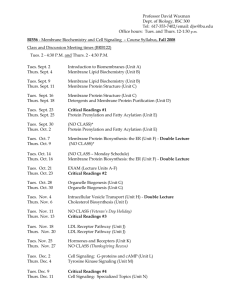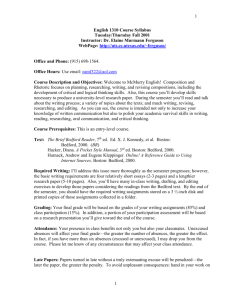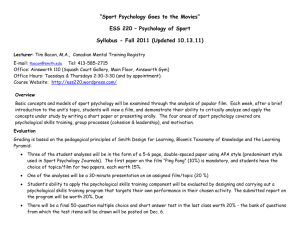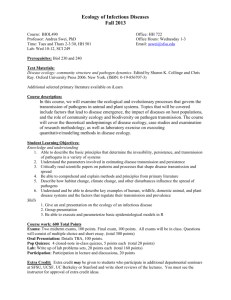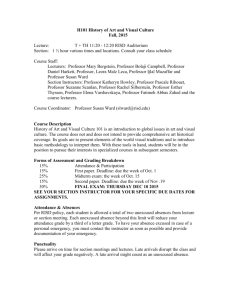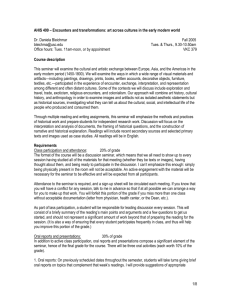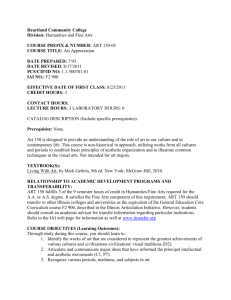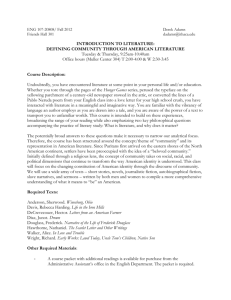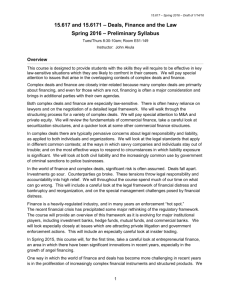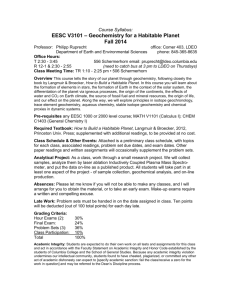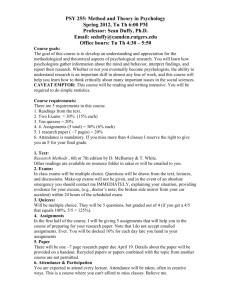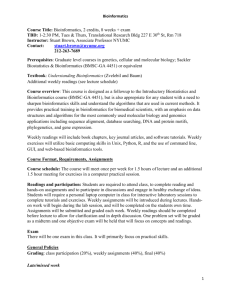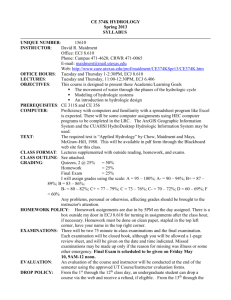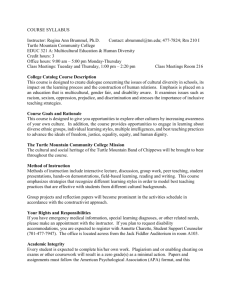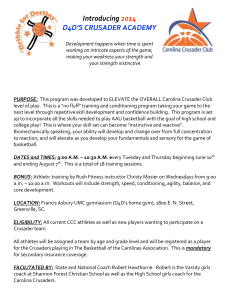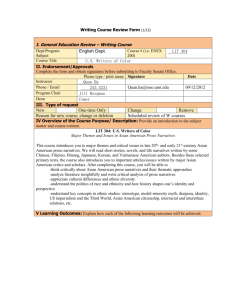Schedule
advertisement
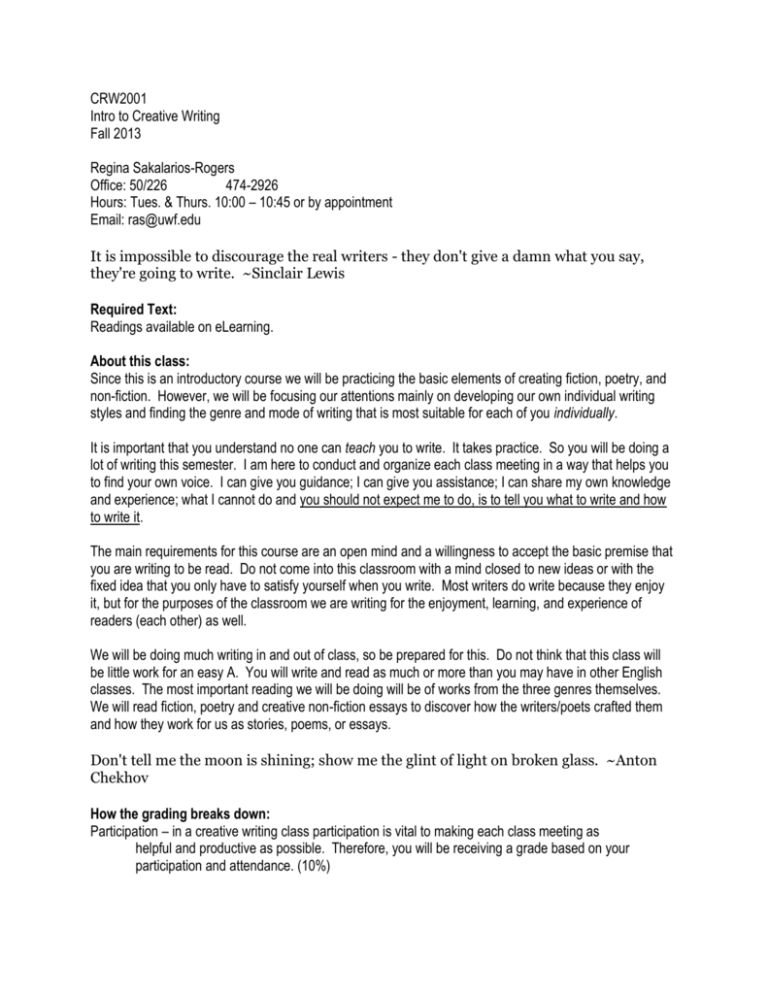
CRW2001 Intro to Creative Writing Fall 2013 Regina Sakalarios-Rogers Office: 50/226 474-2926 Hours: Tues. & Thurs. 10:00 – 10:45 or by appointment Email: ras@uwf.edu It is impossible to discourage the real writers - they don't give a damn what you say, they're going to write. ~Sinclair Lewis Required Text: Readings available on eLearning. About this class: Since this is an introductory course we will be practicing the basic elements of creating fiction, poetry, and non-fiction. However, we will be focusing our attentions mainly on developing our own individual writing styles and finding the genre and mode of writing that is most suitable for each of you individually. It is important that you understand no one can teach you to write. It takes practice. So you will be doing a lot of writing this semester. I am here to conduct and organize each class meeting in a way that helps you to find your own voice. I can give you guidance; I can give you assistance; I can share my own knowledge and experience; what I cannot do and you should not expect me to do, is to tell you what to write and how to write it. The main requirements for this course are an open mind and a willingness to accept the basic premise that you are writing to be read. Do not come into this classroom with a mind closed to new ideas or with the fixed idea that you only have to satisfy yourself when you write. Most writers do write because they enjoy it, but for the purposes of the classroom we are writing for the enjoyment, learning, and experience of readers (each other) as well. We will be doing much writing in and out of class, so be prepared for this. Do not think that this class will be little work for an easy A. You will write and read as much or more than you may have in other English classes. The most important reading we will be doing will be of works from the three genres themselves. We will read fiction, poetry and creative non-fiction essays to discover how the writers/poets crafted them and how they work for us as stories, poems, or essays. Don't tell me the moon is shining; show me the glint of light on broken glass. ~Anton Chekhov How the grading breaks down: Participation – in a creative writing class participation is vital to making each class meeting as helpful and productive as possible. Therefore, you will be receiving a grade based on your participation and attendance. (10%) Exercises – you will be writing both in class and out of class. Sometimes we will have in class writing exercises and sometimes we will have out of class writing exercises. You will be expected to share at least 4 of these in class. You can share as many as you choose though. I will not be collecting all of your exercises, but I’m not going to tell you which ones, so do them all. (25%) Workshops – we will be workshopping your stories, essays, and poems throughout the semester. You must be in attendance on your workshop day and have your work posted to the appropriate date on the eLearning Discussion board by the time posted on the workshop schedule. Missing your workshop will seriously hurt your grade, as I will take 20 points from the grade on your work and 20 points from your workshop grade.. You must be in attendance for all of the workshops; you will lose 10 points from your workshop grade for each. You must sign up to have 1 of your creative works workshopped. (15%) Creative work – you will turn in three creative works. One short story, one creative non-fiction essay, and one group of poems. These are the major weight of your grade, so you cannot afford to miss one. (30%) Final project – This will be due on the last day of class. I will explain it at length well before it is due. In short, it is a publishing project requiring you to “get involved” again with one of your creative works from the semester. (20%) All work must be printed, not handwritten. This, of course, does not apply to any work we do in class. All my life I’ve looked at words as if I were seeing them for the first time. ~ Ernest Hemingway Objectives for the course: + learn the fundamentals of fiction, poetry, and nonfiction genres + practice crafting fiction, poetry, and non-fiction through application of the fundamental principles of each genre. + find your own personal writing voice + identify the genre or genres in which you are most creative + experience new forms of each genre and the creative ways in which you can personally transform each to your own particular style and voice. Substitute "damn" every time you're inclined to write "very;" your editor will delete it and the writing will be just as it should be. ~Mark Twain Statement on Plagiarism: Plagiarism is academic dishonesty-willfully copying someone else’s work without acknowledging the source(s) or pretending that the work of a “ghost writer” is the student’s own. Plagiarism is a very serious offense, and both the English Department and the University have stringent policies for handling offenders. A student found guilty of plagiarism may receive a failing grade on the assignment, text, or for the course. The student may also be referred to the CAS Dean for further action by the Academic Standards Committee. You must turn in original work for this class. No use of previously written works or works in progress. Schedule: Consider this schedule highly tentative; it can and will change if necessary. This schedule merely lists the topics we will be covering, dates of workshops and due dates for the creative works. I will give you the exercise assignments each day. Readings are on the content page of the eLearning site established for this course. Tues., Aug. 27th – Introduction to course What is “creative” about writing? What do you read? Thurs., Aug. 29th – Read Vonnegut “Creative Writing 101” Read Annie Dillard “Notes for Young Writers” Tues., Sept. 3rd – Three genres – Poem, Story, Essay Exercise – Find definitions for each and examples. Do not print out the examples, just summarize why you chose each as example. Thurs., Sept. 5th – Formatting What stories, poems, and essays look like Tues., Sept. 10th – Reading Read Estess & McCann “Creative Reading & Critical Reading” Read Jamaica Kincaid “Girl” Thurs., Sept. 12th – Nonfiction Read Lee Gutkind “5 Rs of Creative Nonfiction” Read Brent Staples “Just Walk on By” Exercise in class Tues., Sept. 17th – Read Carl Hiaasen “Real Life That Bizarre and Brazen Plagiarist” Exercise – Bring 2 nonfiction pages – 1 true and 1 stretched Thurs., Sept. 19th – Being observant Read Stern “Showing and Telling” Read Leah Kamisky “Writer at Work” www.creativenonfiction.org/online-reading/writer-work Exercise in class Tues., Sept. 24th – Your voice Read Osamu Dazai “No Kidding” Read Hunter S. Thompson “Generation of Swine” Exercise in class Thurs., Sept. 26th – Mock workshop Clarity, conciseness, and proofreading Tues., Oct. 1st – Workshop Thurs., Oct. 3rd – Workshop Essays due for those who did not workshop nonfiction Tues., Oct. 8th – Fiction basic elements Read Ernest Hemingway “A Very Short Story” Thurs., Oct. 10th – Plot & Structure Read “Structure: From Scenes to Plot” Read Shirley Jackson “The Lottery” Exercise – Read Kawabata “The Jay” change the ending (after the bold black Line) in a way that remains consistent with the rest of the plot Tues., Oct. 15th – Character Read character sketching on eLearning Exercise story in character (posted on eLearning under “exercises”) Read Edgar Allan Poe “Tell Tale Heart” Thurs., Oct. 17th – Point of View Read William Faulkner “A Rose for Emily” Exercise – change p.ov. for Poe story Tues. , Oct. 22nd – Meaning Read Donald Barthelme “The School” Read George Saunders “The Perfect Gerbil” Thurs., Oct. 24th – Exercise in class Tues., Oct. 29th – Workshop Thurs., Oct. 31st – Workshop Stories due for those who did not workshop Tues., Nov. 5th – Poetry – speaker and poet Read David Kirby “What a Poem is Not” Read Lord Byron “Lines Inscribed Upon a Cup Formed from a Skull” Read Shakespeare “Sonnet 130” Thurs., Nov. 7th – Rhythm Read “Poetic Rhythm” Read Dylan Thomas “Do Not Go Gentle Into That Good Night” Read William Blake “The Chimney Sweeper” & “The Chimney Sweep” Exercise in class Tues., Nov. 12th – Imagery Read “Imagery” Read Wilfred Owen “Dulce Et Decorum Est” Read “Haiku & Tanka” Exercise in class Thurs., Nov. 14th – Read “Sound of Words” Read “Jabberwocky” Read Gwendolyn Brooks “We Real Cool” Exercise in class Tues., Nov. 19th – Workshop Thurs., Nov. 21st – Workshop Poems due for those who did not workshop Tues., Nov. 26th – Publishing Thurs., Nov. 28th – Thanksgiving – no class Tues., Dec. 3rd – Revision Exercise – bring one paragraph revision plan for each story, poem, essay Thurs., Dec. 5th – Final Project Due Publishing discussion


